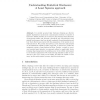Free Online Productivity Tools
i2Speak
i2Symbol
i2OCR
iTex2Img
iWeb2Print
iWeb2Shot
i2Type
iPdf2Split
iPdf2Merge
i2Bopomofo
i2Arabic
i2Style
i2Image
i2PDF
iLatex2Rtf
Sci2ools
133
click to vote
PET
2012
Springer
2012
Springer
Understanding Statistical Disclosure: A Least Squares Approach
It is widely accepted that Disclosure Attacks are effective against high-latency anonymous communication systems. A number of Disclosure Attack variants can be found in the literature that effectively de-anonymize traffic sent through a threshold mix. Nevertheless, these attacks’ performance has been mostly evaluated through simulation and how their effectiveness varies with the parameters of the system is not well-understood. We present the LSDA, a novel disclosure attack based on the Maximum Likelihood (ML) approach, in which user profiles are estimated solving a Least Squares problem. Further, contrary to previous heuristic-based attacks, our approach allows to analytically derive formulae that characterize the profiling error of the LSDA with respect to the system’s parameters. We verify through simulation that our predictors for the error closely model reality, and that the LSDA recovers users’ profiles with greater accuracy than its predecessors.
Related Content
| Added | 28 Sep 2012 |
| Updated | 28 Sep 2012 |
| Type | Journal |
| Year | 2012 |
| Where | PET |
| Authors | Fernando Pérez-González, Carmela Troncoso |
Comments (0)

